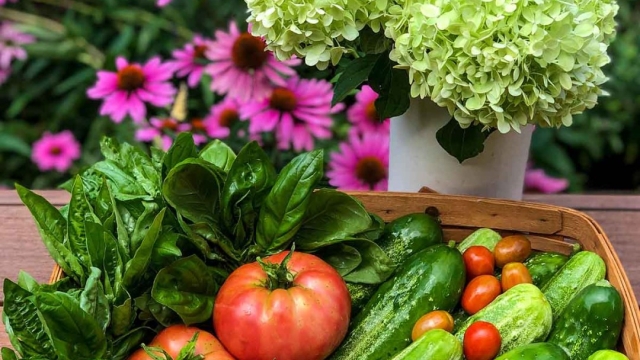
Organic gardening is a wonderful, nature-friendly way of cultivating plants and reaping the rewards of a bountiful harvest. It allows us to connect with the earth, nurture it, and create sustainable and healthy spaces for both us and the environment. With a rich history and deep commitment to quality, ‘Kellogg Garden’ Products has been a trusted name in the organic gardening community for generations. As a family-owned and operated company, their passion for organic gardening runs deep, and they have become synonymous with success in this field.
As we embark on this journey of mastering the art of organic gardening, it is important to understand the principles that guide us. Organic gardening is rooted in the belief that nature knows best, and by working in harmony with its rhythms, we can foster healthier soil, stronger plants, and a more abundant ecosystem. By eliminating the use of synthetic pesticides, herbicides, and fertilizers, organic gardening not only prioritizes the health of our plants but also contributes to the well-being of our planet.
While the path to becoming a successful organic gardener may seem daunting, fear not, as this article will equip you with the knowledge and techniques needed to bloom with green fingers. So, let’s roll up our sleeves, dig into the rich soil, and discover the wonders and rewards of organic gardening together!
Benefits of Organic Gardening
Organic gardening offers numerous benefits that contribute to a healthier lifestyle and a greener environment. By avoiding synthetic chemicals and focusing on natural, sustainable practices, organic gardeners can enjoy the following advantages:
-
Healthier Food: One of the key benefits of organic gardening is the production of healthier, more nutritious food. By avoiding the use of synthetic pesticides and fertilizers, organic gardeners cultivate crops that are free from harmful residues. This results in fruits, vegetables, and herbs that are not only tastier but also richer in essential vitamins and minerals.
-
Environmental Conservation: Organic gardening promotes environmental conservation by minimizing harm to the ecosystem. It encourages the use of natural methods to control pests and diseases, such as companion planting and biological pest control. By avoiding synthetic chemicals, organic gardeners protect the biodiversity of beneficial insects, birds, and soil microorganisms, which are vital for a balanced and resilient ecosystem.
-
Sustainability: Organic gardening is rooted in sustainable practices that focus on the long-term well-being of the soil and surrounding ecosystem. By utilizing compost and organic matter, organic gardeners improve soil fertility, structure, and water-holding capacity. This helps to prevent soil erosion and enhances the overall health of the garden, ensuring its productivity for years to come.
Remember, organic gardening not only provides personal benefits but also contributes to a healthier planet for future generations. By embracing this natural and eco-friendly approach, we can all play a part in creating a more sustainable and vibrant world.
https://kellogggarden.com/blog/raised-beds/how-to-make-a-raised-bed-using-pallets/
The Legacy of Kellogg Garden Products
For over four generations, Kellogg Garden Products has been a trusted name in the world of organic gardening. As a family-owned and operated company, our roots run deep and reflect our commitment to providing the highest quality products for garden enthusiasts. With a rich heritage and a focus on sustainable practices, Kellogg Garden Products has become synonymous with excellence in organic gardening.
At Kellogg Garden Products, our journey began with a vision to create gardening solutions that align with nature’s principles. We understood the importance of nurturing the soil, allowing plants to thrive naturally without the use of synthetic chemicals. This vision led us to develop a range of organic gardening products that are safe for both humans and the environment.
As our reputation grew, so did our dedication to innovation. We continuously strive to push the boundaries of organic gardening, developing new techniques and products that help gardeners achieve their greenest dreams. From composts and soils to fertilizers and pest control solutions, Kellogg Garden Products remains at the forefront of the industry, ensuring that gardeners have access to the best tools to nurture their plants organically.
Kellogg Garden Products understands the vital role that organic gardening plays in promoting a healthier planet. By embracing sustainable practices and focusing on natural methods, we contribute to the preservation of biodiversity, reduce pollution, and create a more balanced ecosystem. With a passion for environmental stewardship, we are proud to be part of the growing movement towards sustainable gardening.
In conclusion, the legacy of Kellogg Garden Products is deeply rooted in our commitment to organic gardening and sustainable practices. With a history spanning four generations, we continue to provide gardeners with the finest organic gardening products that nourish the Earth, nurture plants, and inspire the greenest thumbs worldwide.
Tips for Successful Organic Gardening
-
Soil Preparation: The foundation of any successful organic garden lies in the quality of the soil. Start by enriching your soil with organic matter such as compost, manure, or leaf mold. These natural amendments add nutrients, improve soil structure, and encourage beneficial soil organisms. By nurturing your soil, you create a healthy environment for your plants to thrive.
-
Companion Planting: Harness the power of nature by practicing companion planting in your organic garden. Some plants have natural symbiotic relationships, where one plant helps to repel pests or enhance the growth of another. For example, planting marigolds near your tomatoes can deter harmful insects such as nematodes. Research and plan your garden layout to maximize the benefits of companion planting and create a harmonious ecosystem in your garden.
-
Organic Pest Control: As an organic gardener, it’s important to find natural ways to control pests without relying on harmful chemicals. One effective method is to introduce beneficial insects that prey on garden pests, such as ladybugs for aphid control or praying mantises for caterpillar control. Additionally, you can use organic pest deterrents like neem oil or diatomaceous earth. Regular monitoring of your plants and prompt action can help prevent pest infestations from getting out of control.
Remember, successful organic gardening requires patience and observation. Each garden is unique, and it may take some trial and error to find the best methods for your specific situation. By following these tips, you’ll be well on your way to mastering the art of organic gardening and creating a lush, thriving paradise in your own backyard.
Please let me know if there’s anything else I can assist you with.



